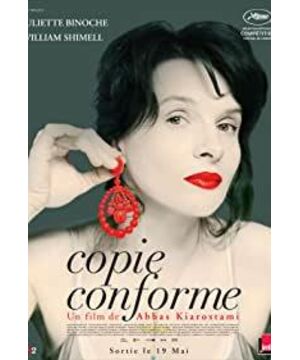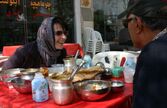Take the famous land trilogy as an example. Although "Life and Longevity" is a documentary film facing a major earthquake, the production of the film started from the search for the little protagonist in "Where Is My Friend's Home", and the first The three "The Lover Under the Olive Tree" are completely reinterpreted and reorganized from a fragment in "Life and Life", the so-called installation art. From a separate point of view, the three films have their own emphasis, and they are all independent of each other, but if viewed in comparison, it is a typical derivative of "one life two, two life three" style, and the director's interest and pursuit are even more " The subtlety and subtlety of "Three Lives and All Things". For example, the young couple who got married after the earthquake in "Life and Life", because of the nature of the documentary, the audience is obviously willing to recognize the truth of the film and take it for granted with the truth of life, but in "The Lover Under the Olive Tree", The director emphasized from the very beginning that they were making a movie, and that the young couple in the previous work was not a husband and wife in reality. This fact is equivalent to overturning the previous truth. If the previous truth is false, then "Life and Life" faces a major earthquake, and the theme of "flowers on the ruins" has become the director's wishful thinking and even self-inspiration. Prostitute? The problem doesn't stop there. If there is no "The Lover Under the Olive Tree", who would question the truth of "Life and Life"? In other words, the audience did not deny the film, but Abbas himself took the lead in denying himself. Emphasizing "truth", but using different forms of "truth" to obscure or even deny the original "truth", such examples are numerous in Abbas' films, such as the actor who is the protagonist at the end of "The Taste of Cherry" Sliding through the mirror, it is as much a rebirth of the protagonist in the film as it is a behind-the-scenes look at the actors outside the film. Another example is "Close-Up" which reproduces the history of the parties involved, makes it clear that it is a copy but deliberately creates a sound distortion effect to fully restore the scene, etc. These are all falsifications on the basis of the clear truth, and the truth of the story and the truth of life are confounded and merged. Based on this level, Godard's claim that "movies start with Griffith and end with Abbas" is naturally not without reason.
The question is, are such pseudo-documentaries the truth is in hand and once and for all? What kind of changes and innovations must Abbas' fresh-style true and false propositions rely on to ensure that they can be eaten all over the world? When this effort came to "Princess Xilin", I felt that it was more difficult to make different faces show different vivid expressions to an imaginary movie, although it was still about true and false, fact and imagination The structure and exploration of the film, but if the film becomes so monotonous and boring, I am afraid that it will reach a dead end, and it will really "stop at Abbas", right?
Fortunately, "Reproduction as is" once again surprised people. It certainly isn't just a chatter (or philosophy or even thesis) movie in my opinion. Specifically, I would like to use Wu Chenjun's short story "The Scholar of the Ming Dynasty" as an analogy.
The novel begins with a brief account of the first half of Yang Yi's life, a scholar from the Ming Dynasty, and then writes that he stayed in an inn one day, and read a book when he was bored. At this point, the author has changed his pen and began to write the content of the book in detail, a war story during the Northern and Southern Dynasties. At this point in the novel, Yang Yi was inexplicably left behind, and the characters in the novel, the story characters of the Northern and Southern Dynasties, became the protagonists, and then, the protagonists of the Southern and Northern Dynasties encountered a scholar from the Ming Dynasty. How and why did the latter appear here? fable? cross? Weird power? The author completely avoids talking about it, as if such an encounter is justified, there is no cause and effect, only the present. What’s even better is that at the end of the novel, scholars from the Ming Dynasty came to the Southern and Northern Dynasties, confusing the time, while the Prime Minister of the Southern and Northern Dynasties, because they didn’t understand what the “Ming Dynasty” was, asked Yang Yi “Where is the Ming Dynasty”, which also confused the space.
The beauty of the form and theme of "Reproduction as It is" is similar to that of Wu Chenjun's novel. It has a "Before Sunset"-esque beginning and a "Masquerade"-esque ending. If Abbas has been working on "blatant fraud" before, then I have to admit that this time, the effect has been as good as the real one. The art of film can be explored to this point, not "stopping at Abbas", but starting from Abbas again.
View more about Certified Copy reviews











